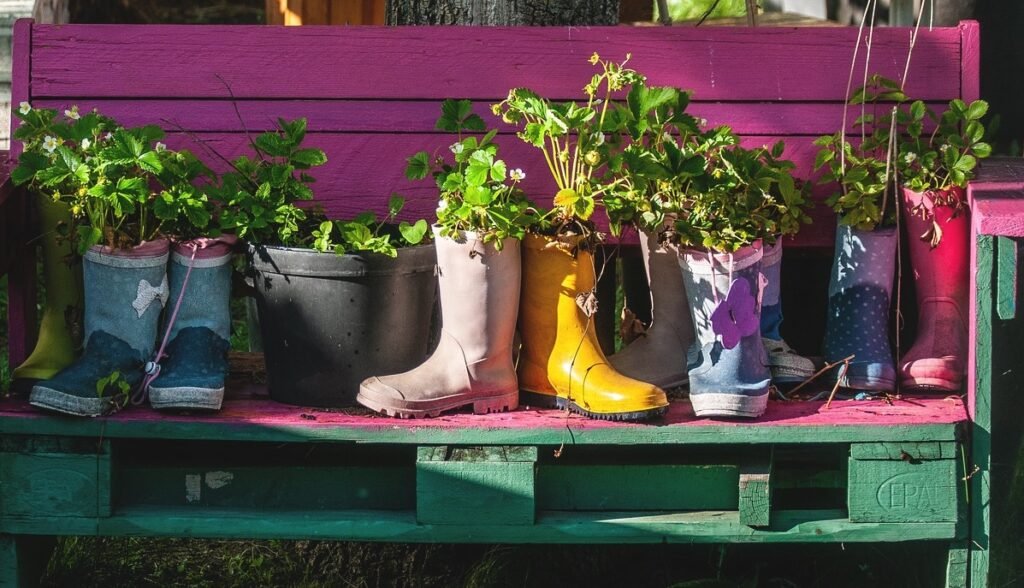Why is Growing Your Own Vegetables fun and good for the environment?
Table of Contents
Grow your own, have fun, and help the Planet
Why is growing your own vegetables good for the environment?
For a good reason, sustainability is a hot topic. We are all concerned about our impact on the environment and the future of our planet. The good news is that it’s easy to improve things if we all contribute. And it can even be fun!
Many don’t realize that global food consumption significantly contributes to environmental degradation and creates massive amounts of non-recyclable plastic waste. Do you want to reduce your ecological footprint and live more sustainably? Have you ever considered growing food in your garden or on the balcony?
What about all the plastic?
If we look closer at our household, we find that we produce a lot of non-recyclable waste. There are a lot of plastic products and garbage in the kitchen: we buy green beans wrapped in plastic, use disposable plastic bags to put our bananas in, and so on.
See also> Kitchen Hacks How To Make Zero Waste In The Kitchen
You can reduce your plastic footprint while having fun and saving money!
The shocking reality behind plastic recycling.
Microplastics In Us: A Time Bomb
What can we do?
Many plastic products make it into our kitchen, which we can give a second life. For example, many vegetables can be easily grown in containers or nursery pots. Even if you don’t have much space, you can grow some delicious plants! Good vegetables for this are, for example, beetroot, carrots, green beans, herbs, peas, potatoes, radishes, chili peppers, peppers, lettuce, spring onions, and tomatoes.
Just take a close look at your waste and throw yourself into upcycling. Tin cans, for example, are ideal for creating an herb garden on the windowsill. Or how about a vertical garden made of plastic bottles? Let your creativity run free here, and give your plastic waste a second chance.

See 13 Useful Tips on How You Can Reduce Plastic Right Now
and > 5 Straightforward Hacks To Reduce Plastic Waste In Your Home
Compost
Did you know that you only need three things to compost? You need “brown” components, such as dried leaves and twigs, which you can pick up, then add the “green” components. These are grass clippings, vegetable waste, leftover fruit, or coffee grounds. Add some water, and you have your own compost at home!
If you keep the three components in balance, the compost should be of good quality. So the next time you have leftovers or scraps of food in your kitchen, you know what to do: Instead of throwing them in the trash can, throw them in the compost! Composting reduces the need for chemical fertilizers, methane emissions, and your carbon footprint.
But the recycling fun in your kitchen continues beyond there. There are many herbs and vegetables that you can regrow from their leftovers. Lettuce, celery, lemongrass, sweet potatoes, ginger, onions, and garlic can easily regrow. It makes the gardener’s heart beat faster, is good for the environment, and saves money!
The ecological footprint
Did you know that a small family consumes a load of a light truck, an average of 1,200 kilograms of food per year? A truck emits 150 grams of carbon dioxide per kilometer driven. That is the same amount of carbon dioxide a commercial airline produces in a three-hour flight.
Are Imported Fruits and Vegetables good for your health?
Growing herbs and vegetables
With your green thumb, you can get started, reduce your carbon footprint, and protect the environment. What is there to consider when growing your first herbs and vegetables?
These are the basics:
- When choosing a location, you should choose a place with plenty of sunlight throughout the day.
- Nutrient-rich soil is the key to everything. Use your homemade compost here or organic fertilizer.
- Start with something easy and learn the dos and don’ts of tending to your small garden.
Growing a large amount of food requires less space than you think.
It is not only fun growing your own vegetables but also good for the environment and your wallet.
How To Grow Your Own Herbs To Enjoy Them Fresh
Here is an opportunity to learn and start growing some fresh food. It’s excellent for health, community, AND for the planet. Our friends at Grow Your Own Vegetables are hosting a totally FREE event that will show you how.
Here’s the deal:
You CAN grow a non-stop supply of fresh, organic food in less time than it takes you to go to the grocery store every week. And growing organically is great for the environment, too!
Join the gathering of fresh food advocates and homegrown revolutionaries, where hundreds of thousands of people from around the world gather to get the tips and tricks they need to grow healthier food for a happier planet.
Discover how to rejuvenate precious topsoil and contribute to a more stable climate for future generations while you put nutrient-rich food on your table. It’s a win-win!
Register for the FREE event today:
Together, we can create a healthier, happier planet for ALL.
See also > The Advantage of Growing Vegetables and Herbs in a Home Garden
and > 7 Reasons Why You Should Have An Organic Vegetable Garden





